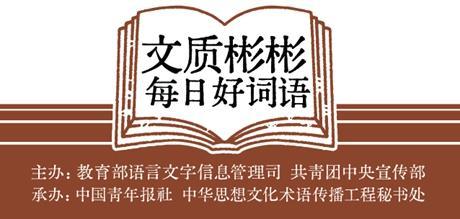文质彬彬·每日好词语|月晕而风,础润而雨
日期:10-06

月晕而风,础润而雨
月亮周围出现光圈就会刮风,柱下石墩返潮就会下雨。“晕”即太阳或月亮周围形成的光圈;“础”即垫在柱子下的石墩。这句古代谚语揭示了“月晕”与“风”、“础润”与“雨”的必然联系,是中国古人基于日常观察和经验积累而形成的天气预测智慧。其中也蕴涵着深刻的哲理:某些事物或现象之间存在着必然联系,此事物、现象构成彼事物、现象出现的征兆,从某征兆可以推知某事态的发生。人一旦把握住事物演变的内在规律,就能从细微之处对事物的演变做出预判。犹言“一叶知秋”“见微知著”。
A Lunar Halo Forecasts Wind, and a Wet Column Base Forecasts Rain.
When the moon has a halo, a wind will arise; and when a column base turns wet, rain will come. Yun is a light circle around the sun or the moon, and chu is a stone that serves as the foundation for a column in a building. This ancient proverb sheds light on the inevitable relationship between the "lunar halo" and "wind" and between the "wet column base" and "rain". They speak to the wisdom of the ancient Chinese who learned to forecast weather through daily observations and repeated experiences. This proverb also contains the insightful realization that there exist necessary connections between certain things or phenomena. One thing or phenomenon signals the occurrence of another thing or phenomenon. Therefore, one can infer a certain thing or phenomenon from a given sign. Once people learn the internal rules governing changes, they can predict them based on their observation of the signs. As the Chinese sayings go, one is able to "tell the arrival of autumn by a falling leaf," and "know the whole by its parts."
引例 事有必至,理有固然。惟天下之静者乃能见微而知著。月晕而风,础润而雨,人人知之。(苏洵《辨奸论》)(任何事情都有发展变化的必然趋势,任何道理也有其本该如此的确凿依据。只有天下冷静而有修养的人,才能从细微处预知事物未来的显著变化。月亮周围出现光圈就会刮风,柱下石墩返潮就会下雨,这是尽人皆知的事情。)
All things have their inevitable trends, and all principles have their fundamental basis. Only those who are calm and cultivated can foretell from the faintest signs that significant changes are going to come. It is commonly known that a lunar halo forecasts wind and a wet column base rain. (Su Xun: On Detecting Wickedness)
